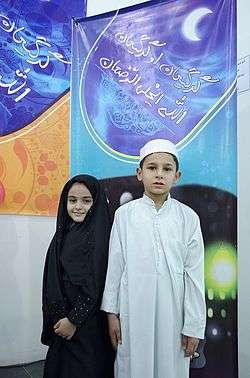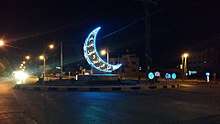Gargee'an
Gargee'an (Arabic: قرقيعان), sometimes spelled as Gerga'oon (Arabic: قرقاعون), is a semiannual[1] celebration, observed primarily in Eastern Arabia, Iraq, and Ahwaz, Iran. It takes place on the 15th night of the Islamic month of Sha'ban and on the 15th night of Ramadan. Gargee'an is marked with children dressing in traditional attire and going door-to-door to receive sweets and nuts from neighbours, whilst also singing traditional songs. The tradition has existed for hundreds of years and deeply rooted in Gulf culture.[2]
.jpg)
Although the celebration of Gargee'an shares superficial similarities with the Halloween custom of trick-or-treating, practiced in some western countries, Gargee'an has no connection with horror and no associated origin with Halloween.
Etymology and Alternative Names
The exact origin of the word Qarqī'ān is unknown though several theories exist; One such theory states that it is derived from Qarqa'ah (Arabic: قرقعة), which means click or snick, the sound of iron pots carrying the sweets hitting each other while serving the sweets.[2] Another theory says that it could originate from the kids of Medina singing "Qarrat Al-'Ain, Qarrat Al-'Ain" (Arabic: قرة العين, literally meaning "eye water-parsnip", that is "wideleaf waterparsnip", but figuratively "darling" and also a title of poet Táhirih) which was changed with time to Qarqī'ān.
The holiday is also known by several different names in each region: Majeena or Karkiaan in Iraq, Garangao or Garangaou in Qatar and Bahrain, Karkee'aan or Qariqaan in Saudi Arabia, Gargee'aan or Girgian in Kuwait and Ahwaz, Garangashoch, At-Tablah or Qarnakosh in Oman, and Hag Al Leylah in the UAE.
Religious Significance

Both Gerga'oon nights are significant to both Sunni and Shia Muslims. Shia believe that Gerga'oon on the 15th of Sha'ban marks the birthday of Imam Muhammad al-Mahdi, the 12th Imam.[3] And that Gerga'oon on the 15th of Ramadan coincides with the birth of Imam Hasan ibn Ali, the second Imam in Shia Islam. As a result, the occasion is seen as a time of happiness and festivities by Shia Muslims, particularly in Bahrain.[4] Events during the night include religious sermons conducted by mosques, carnival-like attractions in much of the capital cities of Eastern Arabia, such as in Manama.[4]
Tradition
Children gather in small choir groups in front of a home and sing. The song is intended to call on God to bless the youngest child of the family, to keep him or her healthy that the mother will remain happy. The more they sing, the more nuts and sweets they receive. The Qarqee'an tradition is intended to spread love, happiness and affection among adults and children.
In modern times, supermarkets, corporates, and malls compete to attract children during this time via advertising in newspapers and on TV, and by offering special promotions and arranging closed Qarqee'an events to market themselves.[5]
References
- Sometimes the holiday is only celebrated annually, during the month of Ramadan.
- "القرقاعون من أهم الاحتفالات الرمضانية الشعبية في مملكة البحرين". Bahrain News Agency. 2 August 2012. Retrieved 3 February 2013.
- ""نسائية سار الرياضي" تقيم مهرجان القرقاعون الأول". Al Wasat. 15 August 2008. Retrieved 4 February 2013.
- "القرقاعون: البحرين تحيي ليلة النصف من رمضان". Al Wasat. 20 November 2002. Retrieved 3 February 2013.
- ""البحرين سيتي سنتر" يحتفل بليلة القرقاعون مساء اليوم". Al Ayam. 31 July 2012. Retrieved 3 February 2013.
